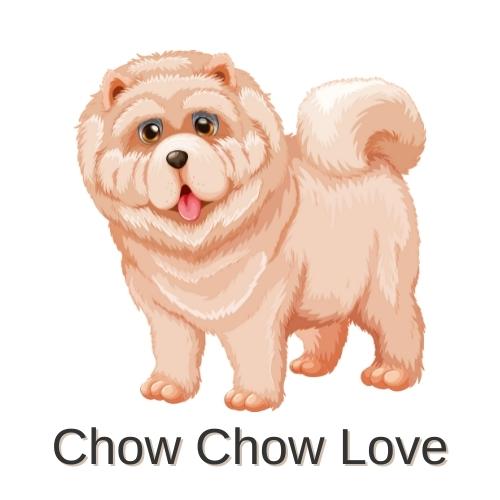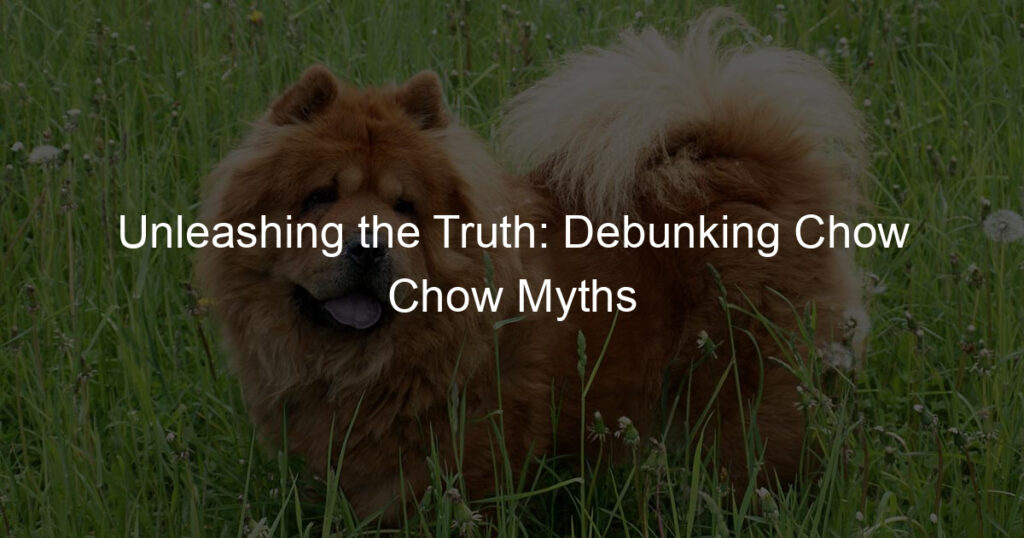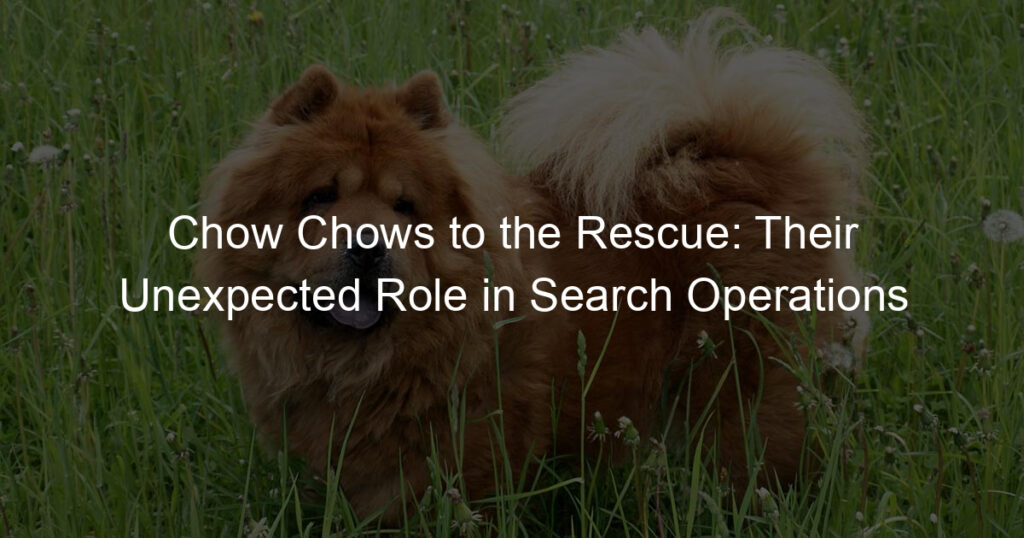Introduction: Understanding Chow Chow
Welcome to the world of Chow Chows, a breed of dog that is as unique as it is lovable. This introduction aims to provide a brief overview of the Chow Chow breed and highlight the importance of understanding their specific breed information. Let’s dive in!
- Brief overview of the Chow Chow breed
- Importance of understanding Chow Chow breed information
The Chow Chow, often simply referred to as the Chow, is a dog breed originally from northern China. The breed is known for its lion-like mane and distinctive blue-black tongue. Chows are medium to large dogs, with a sturdy build and a dense double coat that can be either smooth or rough. They are known for their aloof nature and are often described as cat-like in their independence. Despite their somewhat stern demeanor, Chows are incredibly loyal to their families and make excellent companions when properly socialized and trained. Learn more about Chow Chows on Wikipedia.
Understanding the specific breed information of Chow Chows is crucial for potential owners. This breed has unique needs and characteristics that can greatly impact their care, training, and overall well-being. For instance, their thick double coat requires regular grooming to prevent matting and skin issues. Their independent nature means they may require a different approach to training than more eager-to-please breeds. Furthermore, Chows are known to be somewhat reserved and can be wary of strangers, so early socialization is key. By understanding these breed-specific traits, you can ensure that you are providing the best possible care for your Chow Chow.
Chow Chow Breed Characteristics: Fact vs Fiction
When it comes to the Chow Chow breed, there are many misconceptions and myths that have been circulated over the years. Let’s debunk some of these myths and set the record straight.
Chow Chow Breed Myths
- Myth 1: Chow Chows are Aggressive
- Myth 2: Chow Chows are not Good with Children
- Myth 3: Chow Chows are Lazy
One of the most common myths about Chow Chows is that they are inherently aggressive. This is not true. While Chow Chows can be protective and reserved, they are not naturally aggressive. Their behavior largely depends on their upbringing, training, and socialization.
Another common myth is that Chow Chows are not good with children. This is also a misconception. Chow Chows can be excellent family pets when properly trained and socialized. They are known to be loyal and protective, which can make them great companions for children.
The third myth is that Chow Chows are lazy dogs. While they are not as active as some other breeds, Chow Chows still require regular exercise to maintain their health and happiness. They enjoy walks and playtime just like any other breed.
Now that we’ve debunked these myths, let’s move on to some facts about the Chow Chow breed.
Chow Chow Breed Facts
- Fact 1: Unique Blue Tongue
One of the most distinguishing features of the Chow Chow breed is their blue-black tongue. This is a unique characteristic that sets them apart from most other dog breeds. According to Wikipedia, the blue-black tongue is one of the breed’s most distinguishing features. - Fact 2: Ancient Breed
The Chow Chow is one of the oldest dog breeds in the world. This breed has a rich history that dates back over 2000 years. They were originally bred in northern China and were used for hunting, herding, and protection. - Fact 3: Double Coat
Chow Chows have a dense double coat that can either be smooth or rough. The fur is particularly thick around the neck area, giving it a mane-like appearance. This double coat is not just for looks, it also provides them with protection against harsh weather conditions.
Debunking Common Misconceptions about Chow Chow
Chow Chows are often misunderstood due to a number of common misconceptions. In this section, we will debunk some of these myths and provide you with the real facts about this unique breed.
- Addressing misconceptions about Chow Chow’s temperament
- Debunking myths about Chow Chow’s health issues
- Setting the record straight on Chow Chow’s grooming needs
One of the most common misconceptions about Chow Chows is that they are aggressive and unfriendly. This is not entirely true. While they can be aloof and reserved, they are also known to be incredibly loyal and protective of their families. Their temperament is often a reflection of their upbringing and socialization. With proper training and socialization from a young age, Chow Chows can be affectionate and well-behaved pets. Wikipedia provides a comprehensive overview of the Chow Chow’s temperament.
Another common myth is that Chow Chows are prone to a multitude of health issues. While it’s true that they can be susceptible to certain conditions like hip dysplasia and eye problems, not all Chow Chows will develop these issues. With regular vet check-ups and a balanced diet, Chow Chows can lead healthy and happy lives. It’s important to remember that health issues can occur in any breed, and Chow Chows are no exception. For more information on Chow Chow’s health, visit this Wikipedia page.
Lastly, there’s a misconception that Chow Chows require excessive grooming due to their thick coats. While it’s true that they require regular brushing to prevent matting and keep their coat healthy, they don’t require any more grooming than other long-haired breeds. In fact, Chow Chows are known for their cleanliness and lack of doggy odor. Regular brushing and occasional baths are usually sufficient to keep a Chow Chow’s coat in top condition. For more details on grooming a Chow Chow, check out this Wikipedia article.
In conclusion, it’s important to research and understand a breed before making assumptions. Chow Chows are unique dogs with their own set of characteristics and needs, and they can make wonderful pets for the right owners. Remember, every dog is an individual and should be treated as such.
Chow Chow Breed Reality: Case Studies
Let’s delve into the real-life experiences of Chow Chow owners. These case studies will provide a clearer picture of what it’s like to live with this unique breed.
Case Study 1: Chow Chow in a Family Setting
In this case study, we explore the dynamics of a Chow Chow in a family setting. This will give us a better understanding of how this breed interacts with family members, especially children.
- Overview of the case study:
- Key takeaways:
The Johnson family, consisting of two adults and two children aged 8 and 10, welcomed a Chow Chow puppy into their home. They named him Max. The family had no prior experience with the breed. They were initially drawn to Max’s fluffy appearance and unique personality traits.
Over the course of a year, the family observed Max’s behavior and interaction with each family member. They also noted how he responded to various situations, such as meeting strangers, encountering other dogs, and dealing with different environments.
Max quickly became a beloved member of the Johnson family. He was protective, loyal, and formed a strong bond with each family member. However, his independent nature meant that he sometimes preferred to be alone. He was also wary of strangers, which required careful management when guests visited the home.
Max was not as playful as other breeds, but he enjoyed daily walks and had a calm demeanor. The children quickly learned to respect Max’s space, and in return, he was gentle and patient with them.
The Johnson family concluded that while the Chow Chow breed may not be the right fit for every family, they can make wonderful pets for those who understand and respect their unique characteristics.
In conclusion, Chow Chows can thrive in a family setting if their unique traits are understood and respected. They are loyal and protective, but also independent and sometimes aloof. With the right approach, a Chow Chow can be a wonderful addition to a family.
Case Study 2: Chow Chow as a Working Dog
In this section, we will explore the role of the Chow Chow as a working dog. This case study will shed light on the breed’s capabilities and inherent traits that make them suitable for various jobs.
- Overview of the case study
- Key takeaways
- Chow Chows are versatile: Despite their reputation as a companion breed, Chow Chows can be trained for various roles, including search and rescue, therapy work, and even herding.
- They are intelligent and trainable: Max’s story highlights the breed’s intelligence and trainability. With proper training and socialization, Chow Chows can excel in many tasks.
- Chow Chows are resilient: Max’s work in difficult terrains and under challenging conditions showcases the breed’s resilience and adaptability.
The Chow Chow is a breed known for its versatility and adaptability. This case study focuses on a Chow Chow named Max, who was trained as a search and rescue dog. Max’s story is a testament to the breed’s intelligence, resilience, and work ethic.
In conclusion, the Chow Chow’s versatility, intelligence, and resilience make them suitable for various roles beyond being a family pet. However, it is essential to remember that every Chow Chow is unique, and their suitability for a specific job will depend on their individual personality and training.
Conclusion: Embracing the Chow Chow Breed Truths
As we draw this enlightening journey to a close, it’s important to reflect on the truths we’ve discovered about the Chow Chow breed. These truths not only debunk common misconceptions but also provide a clearer understanding of this unique breed’s characteristics and behavior.
- Recap of Chow Chow facts vs myths
- Final thoughts on understanding Chow Chow
Throughout this article, we’ve uncovered several facts about the Chow Chow breed. Contrary to popular belief, Chow Chows are not inherently aggressive or aloof. Instead, their behavior is largely influenced by their upbringing and environment. We’ve also debunked the myth that Chow Chows are lazy. In reality, they are energetic and require regular exercise to maintain their health.
Understanding the Chow Chow breed goes beyond acknowledging their physical characteristics. It involves appreciating their unique temperament, their need for socialization and training, and their potential health issues. By embracing these truths, we can provide a loving and suitable environment for our Chow Chows, ensuring they live a healthy and fulfilling life.
In conclusion, the Chow Chow breed is a fascinating and complex breed that deserves our understanding and respect. By debunking myths and embracing truths, we can ensure that our relationship with these wonderful creatures is based on knowledge and love, rather than misconceptions and fear.
Remember, every Chow Chow is unique and deserves to be loved and understood for who they truly are. Let’s continue to educate ourselves and others about this remarkable breed, fostering a world where every Chow Chow is appreciated and cared for in the way they deserve.














